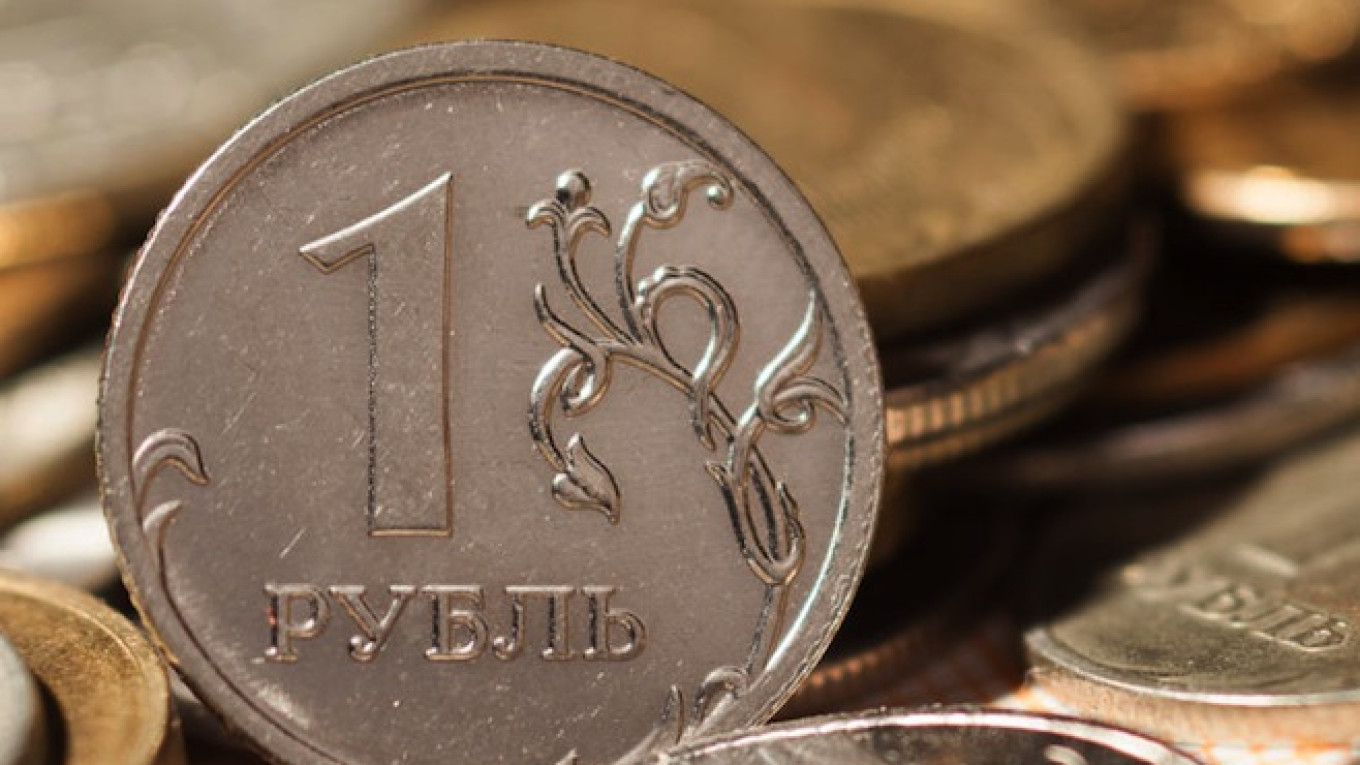The ruble ended the week close to an all-time low following Moscow's decision to ban most food imports from the West in retaliation for sanctions over Ukraine and warnings from NATO that Russia appeared ready to invade its neighbor.
Analysts said any positive impact on Russia's balance of payments from Thursday's ban was outweighed by an investor exodus due to the conflict since mid-April between pro-Russian rebels and government forces in eastern Ukraine.
"The markets are preparing for the worst based on what's going on in east Ukraine, where the fighting continues, no one wants to agree with anyone and Russia is building up troops on the border," said Igor Akinshin from Alfa Bank.
The ruble eased 1.5 percent versus the dollar this week, not far off an all-time low of 36.73 reached in March after Russia annexed Ukraine's Crimea peninsula. Dollar-denominated Russian stocks were down 3.5 percent.
The ban on all meat, fish, dairy, fruit and vegetables from the United States, the 28 European Union countries, Canada, Australia and non-EU member Norway will last a year, showing President Vladimir Putin is preparing for a long stand-off.
A stronger than expected measure, it could isolate Russian consumers to a degree unseen since Soviet days. Sanctions and the currency's slide have already bankrupted several airlines and tourist firms, ruining summer holidays for many Russians.
The government has also upset the middle class by approving a plan to use contributions to employees' privately managed pension funds to plug budget holes for a second year running.
In a sign ordinary Russians' purchasing power is declining, car sales slumped 23 percent year-on-year in July after a 17.3 percent decline in the previous month.
"The overall trend is worrisome, and unlikely to improve fundamentally any time soon," said Joerg Schreiber, Chairman of the Automobile Manufacturers Committee at the Association of European Businesses lobby group.
Exodus
State-controlled VTB and Dutch bank ING said investors chose to ignore the potential positive implications of the import ban.
"The import ban is marginally positive in a six to 12 month period as a general factor affecting the current account, but currently capital outflows are still on a higher scale than this," said Dmitry Polevoy, Russia economist at ING.
Russians tracked the ruble-dollar rate very closely in the 1990s and early 2000s as they saw the U.S. currency as the best protection against galloping inflation.
That attitude has changed during Putin's 14-year rule, when relative macroeconomic stability on the back of high oil prices allowed people to forget about foreign exchange rates.
That now seems to be coming to an end, with the bans likely to push inflation well above the government's targets and disappointed investors sending billions of dollars abroad as capital flight accelerates.
"Another round of more hawkish actions and rhetoric could put additional pressure on the ruble," VTB said on Friday. "Capital outflows – namely the potential dollarization of deposits – are the key risks.”
Analysts polled by Reuters at the end of last month predicted that capital outflows would reach $118 billion this year, almost double last year's figure.
ING economist Polevoy estimated that the ban on western food imports would save Russia around $800 million a month, a figure probably less than the increase in capital flight as investors flee ruble assets.
"Currently nobody cares about the current account, nobody cares about the trade balance, probably nobody even cares about the high carry [high interest rates] in Russia. People who just want to get out of the country, out of Russian assets, are trying to do it,” Polevoy said.
Investors fear a further escalation following statements from NATO that Russia has amassed large numbers of troops on the border and may invade under the guise of a peacekeeping operation. Moscow has accused Kiev of killing hundreds of civilians in east Ukraine but has denied that it has any plan to send troops across the border.
On Friday, the ruble strengthened slightly on the day and shares were up more than 1 percent, recovering from earlier losses, after a senior Russian security official said Moscow was willing to act as an intermediary to de-escalate the crisis.
Some analysts were skeptical.
"Talk is cheap, and Moscow has many times previously made similar comments calling for negotiations, de-escalation, et al, but its actions on the ground have suggested other things," said Timothy Ash, chief emerging markets analyst at Standard Bank.
See also:
A Message from The Moscow Times:
Dear readers,
We are facing unprecedented challenges. Russia's Prosecutor General's Office has designated The Moscow Times as an "undesirable" organization, criminalizing our work and putting our staff at risk of prosecution. This follows our earlier unjust labeling as a "foreign agent."
These actions are direct attempts to silence independent journalism in Russia. The authorities claim our work "discredits the decisions of the Russian leadership." We see things differently: we strive to provide accurate, unbiased reporting on Russia.
We, the journalists of The Moscow Times, refuse to be silenced. But to continue our work, we need your help.
Your support, no matter how small, makes a world of difference. If you can, please support us monthly starting from just $2. It's quick to set up, and every contribution makes a significant impact.
By supporting The Moscow Times, you're defending open, independent journalism in the face of repression. Thank you for standing with us.
Remind me later.


